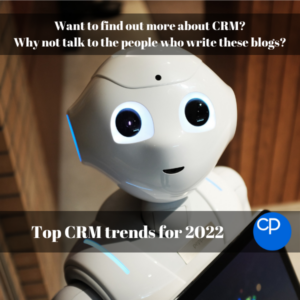 It’s that time of year again. Time to reflect on the year past and consider the future. If 2021 began our recovery from the trauma of the pandemic, then 2022 will challenge businesses to go further and faster than ever before.
It’s that time of year again. Time to reflect on the year past and consider the future. If 2021 began our recovery from the trauma of the pandemic, then 2022 will challenge businesses to go further and faster than ever before.
The trends we identified last year were: –
- CRM’s increasing role as a system of record
- Vendor consolidation in the CRM market
- The emergence of low code application platforms
- Using CRM to differentiate and delight customers
Making 2021 a bumper year for predictions coming true.
Unfortunately, it increases the challenge of ensuring this year’s crystal ball is equally prescient!
Trend 1 – The death of CRM systems developed by ERP vendors
The biggest and best platforms in the CRM market have significantly advanced what is considered acceptable in terms of CRM functionality and appearance. As someone who is old enough to remember when green text on a black screen was considered a good user interface, I welcome much of the design innovation that has gone into making my CRM system something I enjoy using.
However, the memo about making applications beautiful was somehow missed by all the major ERP vendors. As a result, if you want to see some truly ugly user interfaces head along to your favourite back-office supplier. Or rather don’t, because it appears increasingly likely that those back-office vendors will throw the towel in and concede that specialist CRM vendors do a much better job. We predict that CRM and ERP integration will be something you chose from specialist vendors. No more just accepting what the back-office author thinks is “good enough.”
Trend 2 – Transparency will become key to CRM platform selection
The big CRM vendors may have moved the game forward in terms of application functionality, but we have seen a growing issue in the way they go to market. Clients are reporting that it is increasingly difficult to identify and predict total project costs.
Modern CRM platforms often rely on third-party apps to deliver key pieces of functionality. Through their various marketplaces and app stores, you can find prebuilt applications that deliver missing functionality. While this reduces development time and cost, these apps are another expense to consider. Unscrupulous vendor salespeople are quick to highlight access to add on functionality but are less willing to highlight or explain the ongoing cost of these apps.
We have a second concern about the transparency of some CRM vendors. This relates to data storage and processing. Sensibly, many CRM platforms do not own their own infrastructure; preferring instead to work with organisations such as Microsoft or Amazon. The benefits of this approach are clear. It is important, particularly for clients in the UK, that you have a clear understanding of where your data will be hosted. Future changes to the UK’s relationship with Europe and data governance (GDPR), mean that any lack of transparency in this area exposes the directors of your company to personal financial risk.
Trend 3 – SMB CRM
The changes that spread out across industry because of the pandemic are becoming clearer. One trend which has emerged is the rightsizing of organisations. Regrettably, this led to resignations and redundancies as people adapt to a new reality. Presented with the opportunity to reinvent themselves many of these people are starting their own businesses. Free from the bureaucracy of larger organisations they are looking for tools that can help them to launch their small business.
The resulting trend is that market-leading CRM platforms that do not scale down to support small businesses will be side-lined. Despite offers for free versions, entrepreneurs are reporting that when they come to rely on a CRM tool, it becomes apparent that some vendors do not value them as a client unless they stump up the high prices paid by much larger organisations.
This will ultimately result in significant growth opportunities for those CRM vendors who have a focus on SMB organisations. it will also mean that much of the insight provided by large consultancy organisations is not directly relevant to SMBs.
SMB CRM vendors will need to ensure not only that their business model supports smaller clients with lower annual recurring revenue, but also that the product does not swamp users with irrelevant features. Consultants and organisations who work with SMB’s as they implement and grow will need to ensure that they are able to support non-technical users.
Trend 4 – CRM success is not defined in terms of data
Modern CRM systems have evolved and now allow for the configuration of a seemingly infinite number of fields within which to store data. Beyond these structured database fields, lie further opportunities to store data on interactions. The long- and well-established functionality that allowed for the storage of phone and meeting notes, has now been joined by tools to ingest social media, SMS, and other message exchanges. Yet all this data storage does not mean that your CRM project will succeed.
For a long time, we have maintained that CRM systems should help you to acquire, retain, and develop long term profitable business relationships. While good data is an essential element, it is what you use that data for, and how it impacts your customers, that will ultimately determine how successful your CRM system is.
Increasingly we are challenging prospects and clients to describe the business process they are trying to support – not the data points required. Using modern business process management techniques and design tools we have helped clients to better understand their business needs and identify how CRM supports improvement.
We have in many cases been surprised by how many business leaders when challenged to explain their business processes struggled. It is sometimes said that “if you cannot explain what you do as a process then you don’t really understand it.” A key element of this trend is the requirement for everyone to develop skills in designing and enhancing business processes.
So, there you have it. 4 trends we think will shape the CRM landscape in 2022. Whether you agree or disagree, let us know in the comments below.




